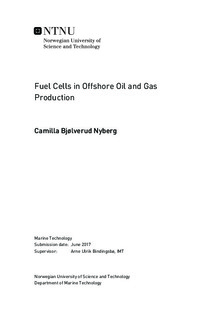Fuel Cells in Offshore Oil and Gas Production
Master thesis
Permanent lenke
http://hdl.handle.net/11250/2455250Utgivelsesdato
2017Metadata
Vis full innførselSamlinger
- Institutt for marin teknikk [3408]
Sammendrag
The petroleum industry is confronted with a two-faced challenge as global energy demandis set to increase simultaneously as greenhouse gas emissions must be reduced in order tocombat global climate change. With the signing of the Paris climate agreement in 2015, theworld's nations agreed to implement actions to keep the global temperature below 2 degree Celsius above pre-industrial levels. Future emissions from the petroleum industry must be reduced as a key way of combating global warming, but also to ensure the future nancial viability of the industry as the cost of emitting carbon is likely to increase as governmental regulations on greenhouse gas emission will be tougher. Increased public pressure for environmental friendly choices will also force the petroleum industry to incorporate environmental considerations into their business models. The petroleum industry is therefore searching for ways to improve energy efficiency while reducing costs and emissions.
The most signicant emitter of greenhouse gasses on offshore installations is gas turbines,which alone account for 81% of total greenhouse gas emissions. Fuel cells are more energy ef-cient and less carbon intensive than gas turbines as a result of different conversion processes when the chemical energy in the fuel in converted to electrical energy. For gas turbines is this process performed through a combustion, while it in fuel cells occurs through a chemical reaction between positively charged hydrogen ions and oxygen. This master thesis considers the possibility for fuel cells to replace gas turbines as power generating system on offshore installations in the future. The thesis explores the main challenges the fuel cell technology faces if applied offshore.
A SWOT analysis is conducted in order to map the strengths, weaknesses, opportunities,and threats for the fuel cell technology. Requirements such as demands of output, efficiency,emission, costs, maintenance and downtime placed on power generating systems offshore areespecially emphasized in the analysis in order to evaluate if the fuel cell technology is a viable option.
The analysis indicates that the fuel cell technology is equally, if not even better, than gasturbines in some areas while it in other areas is unable to meet the demands. The technologyis competitive with gas turbines regarding efficiency, emission, maintenance and downtime.However, it does not meet the requirements set for costs and output. Based on the resultsfrom the SWOT analysis it can be concluded that the fuel cell technology is able to meetparts of the demand placed on power generating systems oshore, but far from all. Based on the position of the technology and its area of application, it is challenging to concludewhether or not the technology is better than gas turbines for power generation offshore.The technology has never been applied offshore; hence it is challenging to compare the twotechnologies. However, it can be concluded that none of the existing fuel cell technologiesare able to satisfy all the demands oshore alone. In order to apply the technology offshorea fuel cell system combining two or more of the already existing technologies has to bedeveloped.
However, the technology has future potential. If the environmental benets are as signicantas expected, the fuel cell technology could be an important way in which the petroleumindustry adjusts to global climate change.
